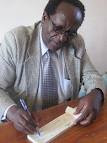 |
| Dr Mgimwa |
The government will spend over 15tri/- during the 2012/2013 financial
year, where 4.5tri/- is to be directed to capital investments.
Finance and Economic Affairs Minister Dr William Mgimwa mentioned in
Dar es Salaam on Monday priorities of the proposed budget as infrastructure,
agriculture, development of industries, development of human resources and
social services, tourism, development of domestic and external business and
development of financial services.
This is not so different from 2011/2012 where Energy, water and
infrastructure were top priority. The budget proposal was presented to the
Parliamentary Committee of finance and the economy headed by Bariadi East MP
(CCM) Andrew Chenge. Discussions on the budget continue on Tuesday.
Meanwhile, the Shadow Minister for Finance, Mr Zitto Kabwe, has
expressed concern over the mounting national debt which has climbed from 7tr/-
in 2009 to 22tr/- in March, this year, prompting the government to spend much
of the proposed 2012/13 budget to service the debt.
Mr Kabwe, who is also Kigoma North Member of Parliament (Chadema), said
in a statement on Monday that the government has proposed to spend 2.7tr/- to
service the debt which is equivalent to 21 per cent of the total budget.
“The cost of servicing the national debt is the largest budget item in
the proposed 2012/13 budget at 2.7tr/- which is equal to 34 per cent of the
whole budget for recurrent expenditure.
The country’s spiralling debt is driving the nation into bankruptcy,”
he said. The government expects to table its budget proposals for the 2012/13
fiscal year in Parliament on June 14 (next Thursday) in Dodoma.
According to Mr
Kabwe, other areas of concern in the proposed budget include inflation which is
largely contributed by food and energy prices at 56.7 per cent of the basket of
goods and services with an inflation rate of 27%.
He also invited ideas on how to tackle unemployment especially youth
unemployment which is a great challenge because despite the country’s economic
growth, the situation has not shown any trickledown effect or translated into
enough jobs.
“We also need to reduce the current account deficit by cutting down on
imports and increasing exports. Statistics shows that by the year ending March
2012, Tanzania import bill totalled 12.6 billion US dollars while exports were
a mere 6.9 billion dollars,” he said.
Mr Kabwe pointed out that the current account deficit stands at 5.2
billion US dollars while the tourism and transport sectors have the potential
of being even bigger foreign currency earners and the proposed gas fired
electricity generation would also help cut down imports.
He said that more domestic revenue to finance development projects are
vital and can be achieved by closing tax loopholes and reigning in on tax
exemptions. “Simultaneous cuts in recurrent spending and scaling up of
development spending would foster stronger growth,” he added.
Source: The Daily News,http://www.dailynews.co.tz

0 comments :
Post a Comment